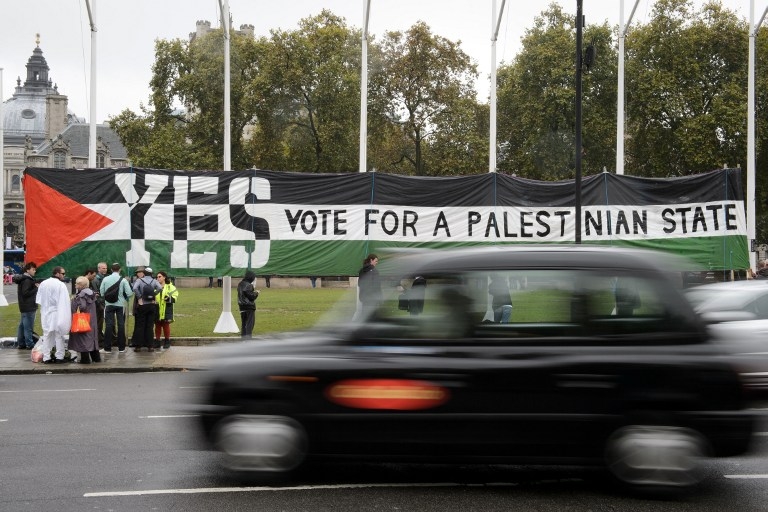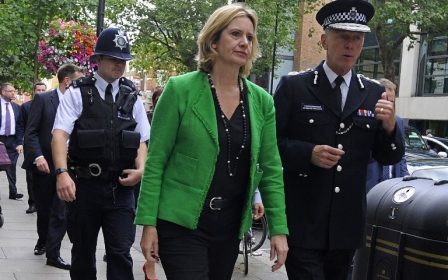'Where to Guv, Raqqa?' UK taxi drivers get Prevent training

Taxi drivers in the UK are being trained to become the "eyes and ears" of local authorities and police in the hunt for potential terrorists as part of safeguarding schemes being rolled out across the country.
Drivers in several British towns and cities are receiving Prevent counter-terrorism training as part of mandatory “knowledge" tests introduced by local councils.
One flagship scheme, run by Calderdale Council in West Yorkshire, northern England, was considered so successful that councillors discussed extending it to staff working in takeaway food outlets and bars.
Manchester City Council also incorporated Prevent awareness into a safeguarding handbook issued to taxi drivers last year, while Dartford Borough Council in Kent is among the latest to introduce Prevent training as part of its safeguarding requirements for taxi drivers.
But taxi industry organisations and trade unions have raised concerns about the training which they say is being introduced in a piecemeal and inconsistent way across the country and risks creating an “air of suspicion” within communities.
Critics of Prevent also questioned the legality of the training and accused the Government of seeking to turn the UK into a "counter-terrorism state" in which citizens were expected to spy on each other.
"This is just one more proof, in a long line of evidence, that Prevent is a legalised, UK-wide spying exercise," Abed Choudary, of the Islamic Human Rights Commission, told Middle East Eye.
Opponents of the Prevent scheme say it is based on flawed theories about the radicalisation process. Its advocates argue that it is primarily concerned with safeguarding those who are vulnerable to being drawn into extremism. At least 550,000 public-sector workers, including teachers and doctors have received training in spotting signs of radicalisation, according to the Home Office.
The document was produced in response to the introduction of the Prevent Duty last year which required public bodies including local councils and individual public-sector employees to demonstrate “due regard to the need to prevent people from being drawn into terrorism”.
'Taxi drivers have a unique reach into society. Ferrying passengers around, they get to see and hear things that the statutory agencies never could'
Local Government Association
It describes how Calderdale had provided Prevent and other safeguarding training covering issues such as child sex exploitation and domestic abuse to 1,000 licensed taxi drivers in four-hour sessions over the space of three months.
“Taxi drivers have a unique reach into society. Ferrying passengers around, they get to see and hear things that the statutory agencies never could,” it says.
The training has also been made mandatory for new drivers applying for a taxi licence while existing licence-holders are required to complete the course every three years.
“Taxi drivers can play a really important role. They can be our eyes and ears. It is about helping them to understand when they may need to act,” said Jo Richmond, the council's neighbourhoods and cohesion manager.
Richmond is due to talk about the scheme at a conference on “Tackling Radicalisation and Promoting Community Integration” aimed at public sector workers in November.
According to the LGA document, feedback from taxi drivers on the sessions was “extremely positive”. “It made me realise it’s not all about driving,” one driver was quoted as saying.
But when MEE approached taxi drivers in Halifax for comment, none were willing to speak about the scheme.
“They are just worried. They do it because it is going to earn them a living,” a local source told MEE after speaking to drivers in the town.
At a council meeting in October 2015, councillor Steve Sweeney said that several other councils were looking to follow a similar approach.
At a previous meeting of the council’s communities scrutiny panel, councillors had asked police whether the taxi driver training could be extended to “other people providing services such as takeaways and bars,” according to council minutes.
Calderdale, which covers the town of Halifax and surrounding areas, was made a Prevent priority area - one of 30 in the country - by the Home Office in 2015, meaning it receives funds both for a local Prevent coordinator and for projects run in conjunction with local communities and partners. Just over seven percent of the area's 200,000 population identified themselves as Muslims at the last census in 2011.
Takeaways and bars
At the communities scrutiny panel meeting in September 2015, police officers told councillors that they spent more time working on far right threats than any other.
A report on the implementation of Prevent to the same panel in March 2015 highlighted the presence of an English Defence League (EDL) branch in the town and said that anti-Islamic and anti-Semitic hate incidents had been reported in the past 12 months.
But it also noted, as pertinent in the local context, that: “There continues to be empathy for the plight of individuals in Syria and Palestine and local charity collections/events continue to take place.”
Calderdale’s safeguarding training was implemented by West Yorkshire Police and an external trainer, Nadeem Mir, a former police chief inspector in Greater Manchester where he implemented a similar scheme.
In August 2015, Manchester City Council issued a safeguarding handbook to 6,000 taxi drivers which contained a section on terrorism and extremism.
“The handbook has been developed to raise awareness about reporting crime and is an opportunity to encourage drivers who are the eyes and ears of our community to report intelligence and any suspicious activity to police,” said Chief Inspector Laura Marler of Greater Manchester Police.
The handbook tells taxi drivers that they should trust their instincts in reporting anything that they believe to be suspicious.
A case study describes a teenage girl on the way to the airport speaking on the phone to someone who she says she will meet her that night on the border of Syria. Another described a mobile phone left in the back of a taxi with a Nazi symbol as a screensaver.
“Preventing terrorism is challenging because it operates in a pre-criminal space before any criminal activity has taken place. It is about supporting and protecting people who might be susceptible to radicalisation, ensuring that they are diverted away before any crime is committed,” it says.
“The nature of your job means you are in contact with people all day long and in some cases for long periods of time. You will know instinctively when someone is acting suspiciously or if something is out of the norm.”
A spokesperson for Manchester City Council confirmed that the contents of the handbook were included in safeguarding tests for taxi licence applicants.
In Dartford, councillors in June agreed to introduce Prevent training as part of the “knowledge test” for taxi license applicants. A star-rated “Better Cab” accreditation scheme was introduced in which to acquire the maximum three-star rating drivers were required “to undertake and pass Council’s Prevent Training”.
A safeguarding advice document for drivers advises them to “take note of odd or unusual behaviour by tenants or guests at a property – terrorists need somewhere to live”.
Tougher licensing rules and mandatory safeguarding training for drivers have been introduced by many councils since a 2014 report into child sex abuse in the Yorkshire town of Rotherham concluded that taxi drivers had played a prominent role in the exploitation of hundreds of children over almost two decades.
In Calderdale, 17 men were convicted in June of systematically grooming and sexually abusing teenage girls in Halifax over a number of years.
Representatives of taxi driver trade organisations told MEE that safeguarding schemes were becoming more common, but questioned the inconsistent way in which they were being implemented and the expectation that drivers should monitor their customers.
'At the end of the day we are only driving cabs'
“Not only have we got to spot potential sex offenders, now we have got to spot terrorists. There are all kinds of courses and schemes that taxi drivers have to take on and they just seem to be getting imposed. At the end of the day we are only driving cabs," said Wayne Casey of the National Taxi Association.
Casey also said that trade organisations and unions representing taxi drivers had not been consulted in developing appropriate courses.
Charles Oakes of the Bolton-based Hackney Drivers Association also said it was questionable whether safeguarding training would make any difference.
“It is basically just telling drivers what to look for. Usually these training sessions finish well within an hour,” he said.
“Taxi drivers are expected to be doctors, social workers, all sorts of things that this trade has never needed. I just wonder at times whether the councils are doing this to make themselves look good.”
Prevent, a strand of the government’s counter-terrorism strategy focused on tackling extremism, faces complaints that it is discriminatory against Muslims and based on flawed theories of radicalisation.
Its advocates argue that it is primarily concerned with safeguarding people vulnerable to being drawn into extremism and has made a positive impact in the lives of thousands of people, but questions have been raised about the quality and consistency of training.
MEE revealed earlier this month that 24 courses deemed unsuitable for a Home Office Prevent training catalogue were still being sold to schools and other public sector institutions.
'It's bending the laws to try and bring more and more people into the army of snoopers'
Kevin Blowe, Netpol
But the extension of Prevent training to taxi drivers highlights the strategy's reach in the private sector as well.
A spokesperson for the Unite union, which represents taxi drivers, told MEE: “This move has the potential to create an air of suspicion in communities where we should be building unity. Our members feel deeply uncomfortable with this approach and Unite will be lobbying politicians to rethink this ill thought out strategy.”
Kevin Blowe, the co-ordinator of the Network for Police Monitoring (Netpol), part of the Together Against Prevent activist campaign, said it was questionable whether making the training mandatory was legal.
“I don’t understand how this is lawful, because taxi drivers are neither public bodies nor government contractors," he told MEE.
"If local councils start demanding that everyone they license must act as Prevent's 'eyes and ears,' then that could spread to include landlord accreditation schemes, food premises, even music venues.
"It's bending the laws to try and bring more and more people into the army of snoopers."
Choudary, of the IHRC, said: "The UK has turned into a counter-terrorism state. A state in which the government views people, particularly Muslims, through a security prism and also encourages communities to view one another in the same way. This is the government getting its citizens to spy on one another."
Middle East Eye sought comment several times from Calderdale Council but a spokesperson said there was nobody available. Dartford Borough Council did not respond to requests for comment.
This article is available in French on Middle East Eye French edition.
Stay informed with MEE's newsletters
Sign up to get the latest alerts, insights and analysis, starting with Turkey Unpacked
Middle East Eye delivers independent and unrivalled coverage and analysis of the Middle East, North Africa and beyond. To learn more about republishing this content and the associated fees, please fill out this form. More about MEE can be found here.





